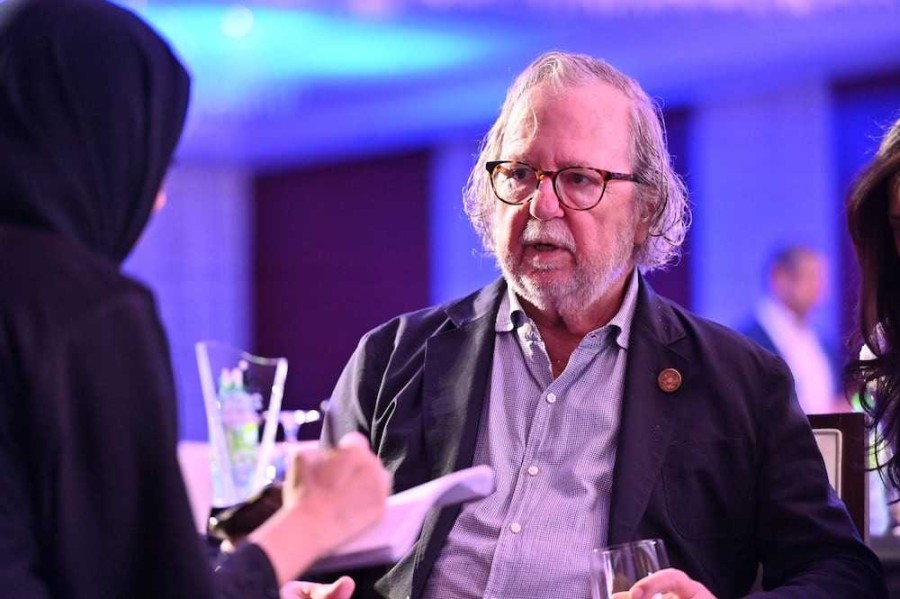Nobel laureate foresees reduced cancer deaths as research continues to pay off

Cancer treatment is becoming so advanced a significant breakthrough could be on the horizon, leading experts have told The National.
They said work being carried out to combat cancer means the disease could someday be treated like a condition that can be managed, rather than be regarded as a death sentence.
The UAE's role in researching cancer was also praised by experts at the global congress of the WIN Consortium, which took place in Abu Dhabi last week.
The event brought together top physicians, researchers and scientists in precision oncology from across the world.
“We will see an acceleration of clinical trials and treatments which will reduce death rates as more data is gathered and [the rate of] genome sequencing increases,” said Nobel laureate Prof James Allison, speaking to The National.
No longer a death sentence
Also speaking at the event was renowned scientist Prof Padmanee Sharma of MD Anderson Carter Centre at the University of Texas - who is married to Prof Allison.
She explained how she was optimistic about the likelihood of making a breakthrough in the fight against cancer.
That optimism, she said, was fuelled by continued advancements in research. “One day, cancer will not be considered as a death sentence. The people can think of cancer like they think
“We are at the tip of the iceberg but we have to get going because we are on the right path.” The likelihood of developing cancer varies, depending on where you get your information from.
In 2022, there were an estimated 20 million new cancer cases and 9.7 million deaths, according to the latest global report from the World Health Organisation's (WHO) cancer section, the International Agency for Research on Cancer (IARC).
About one in five people develop cancer in their lifetime, with approximately one in nine men and one in 12 women dying from the disease, it says.
Lung cancer was the leading cause of cancer death (1.8 million deaths, 18.7 per cent of the total cancer deaths) followed by colorectal cancer (900 000 deaths, 9.3 per cent), liver cancer (760,000 deaths, 7.8 per cent), breast cancer (670 000 deaths, 6.9 per cent) and stomach cancer (660, 000 deaths, 6.8 per cent).
The data in the report, which was released last month, covers 185 countries and 36 types of cancer. While the WHO's report says one in five people will develop some form of the disease during their life, the UK's NHS said the number was much bleaker with one in two likely to develop cancer at some point.
A recent report from the US Cancer Society put the likelihood of getting any type of cancer as one in two for men, and one in three for women.
UAE praised for research
Prof Allison was also effusive in his praise for the work the UAE was doing when it came to cancer research.
“With immunotherapies already approved and a remarkable level of investment dedicated to cancer care, the nation is forging ahead in clinical research and infrastructure development to propel advancements in patient outcomes,” said Prof Allison.
By harnessing data from clinical trials, the UAE aims to tailor immunotherapy treatments effectively, marking a significant stride towards personalised medicine.” Prof Allison, who also works at the MD Anderson Carter Centre, at the University of Texas, was honoured with the Nobel Prize in Physiology or Medicine in 2018.
He was recognised for his pioneering research on cancer immunotherapy, specifically for discovering the CTLA-4 protein, which led to the development of immune checkpoint inhibitors.
He lost his mother, brother and two uncles to cancer, spurring his dedication to finding innovative treatments. He also praised the UAE for its work in learning from past failures and fine-tuning treatments, emphasising the potential to redefine cancer as a manageable condition akin to hypertension.
There are currently more than 457 cancer patients and their families being treated at Cleveland Clinic Abu Dhabi in a tailor-made oncology programme that looks into the genetics of cancer patients and their families.
“The stigma around cancer is becoming less and less because of the new discoveries and also the new modalities of prevention and diagnosis,” said Dr Asma Al Mannaei, executive director of the Research and Innovation Centre at the Department of Health – Abu Dhabi, who was also speaking at the conference.
“We can see that cancer might soon be considered as a chronic disease and we can see a glimpse of a cure happening in the next 10 years.” The event was organised in association with Abu Dhabi's Burjeel Holdings.
